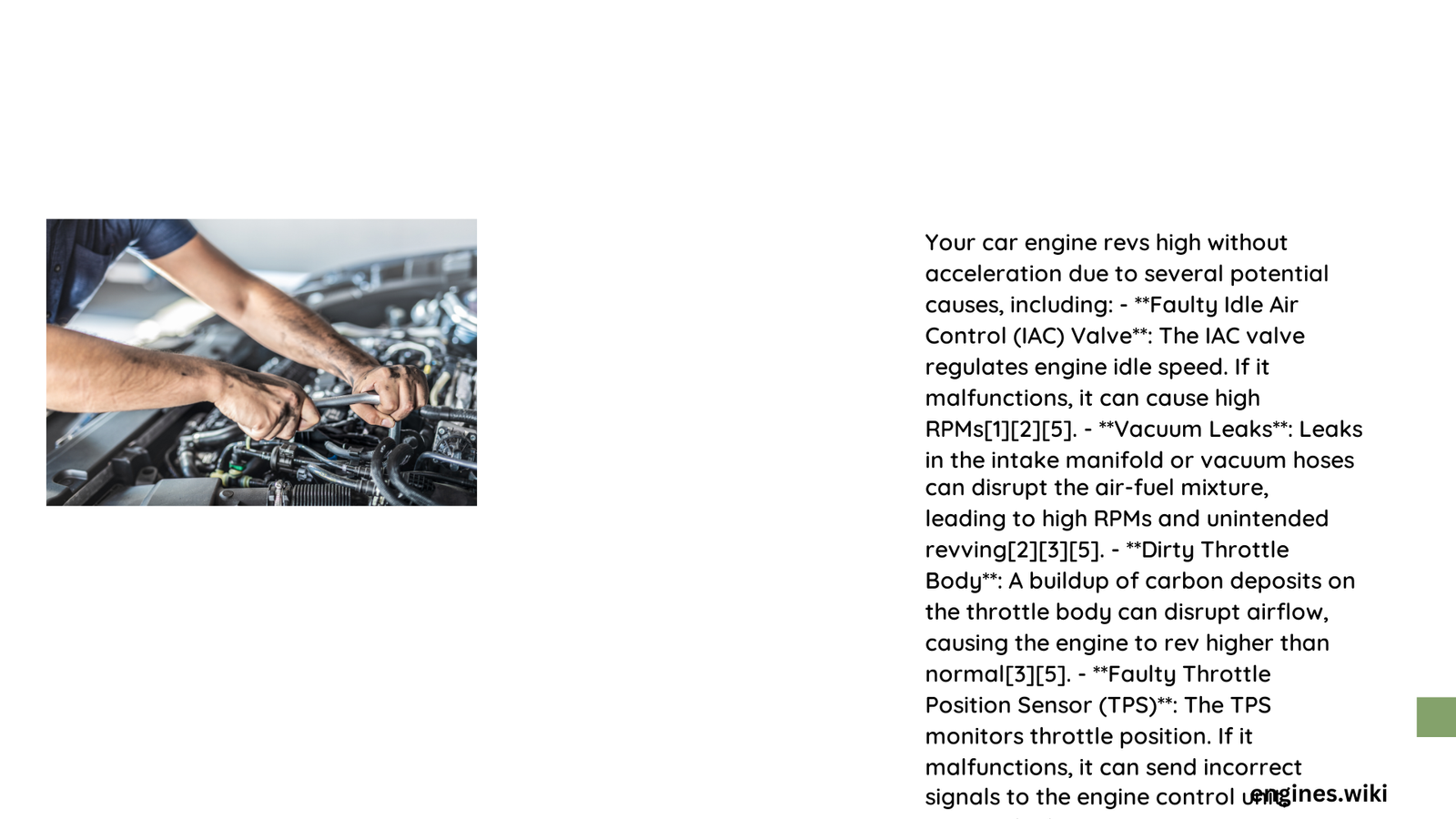Why My Car Engine Revs High Without Acceleration: A Comprehensive Diagnostic Guide
When your car’s engine revs high without acceleration, it signals potential underlying mechanical issues that demand immediate attention. This phenomenon can stem from multiple complex factors, ranging from sensor malfunctions to critical system failures. Understanding these root causes is crucial for preventing potential long-term damage and ensuring optimal vehicle performance.
What Causes Unexpected High Engine RPMs?
High engine revolutions without corresponding acceleration can be attributed to several critical mechanical and electrical system components. The most common culprits include:
- Idle Air Control (IAC) Valve Malfunction
- Disrupts precise engine speed regulation
- Causes erratic idle performance
-
Prevents accurate air-fuel mixture management
-
Throttle Body Complications
- Impedes proper airflow
- Creates inconsistent engine response
- Triggers unexpected RPM fluctuations
Diagnostic Approach for High Engine Revs
| Component | Potential Issue | Diagnostic Method |
|---|---|---|
| IAC Valve | Electrical failure | OBD-II scanner check |
| Throttle Body | Carbon buildup | Visual inspection |
| Vacuum System | Air leaks | Smoke test |
| Transmission | Fluid degradation | Fluid level examination |
How Does the Idle Air Control Valve Impact Engine Performance?
The IAC valve serves as a critical component in maintaining stable engine idle speeds. When malfunctioning, it can cause significant RPM irregularities:
- Electrical Signal Disruption: Compromised communication with Engine Control Unit
- Mechanical Wear: Physical valve mechanism deterioration
- Sensor Inaccuracies: Incorrect air volume measurements
Symptoms of IAC Valve Problems
- Unstable idle speeds
- Difficulty maintaining consistent engine performance
- Increased fuel consumption
- Potential check engine light activation
What Role Do Vacuum Leaks Play in Engine Revving?
Vacuum leaks represent another significant factor contributing to unexpected high engine revs:
- Air-Fuel Mixture Disruption: Introduces unmetered air into combustion chamber
- Pressure Imbalance: Creates irregular engine performance
- Sensor Miscalculations: Triggers incorrect ECU responses
Detection Methods for Vacuum Leaks
- Audible hissing sounds near intake manifold
- Smoke testing of intake system
- Comprehensive pressure diagnostics
- Professional diagnostic scan tool evaluation
Can Transmission Issues Cause High Engine Revs?
Transmission problems frequently manifest through unexpected engine behavior:
- Slipping Transmission: Engine revs increase without proportional vehicle acceleration
- Fluid Degradation: Reduces hydraulic system efficiency
- Mechanical Wear: Internal component deterioration
Potential Transmission-Related Complications
- Delayed gear shifting
- Inconsistent power delivery
- Increased mechanical stress
Recommended Diagnostic Steps
- Perform comprehensive OBD-II scan
- Inspect IAC valve and throttle body
- Check vacuum system integrity
- Evaluate transmission fluid condition
- Consult professional automotive technician
Prevention and Maintenance Strategies
- Regular scheduled maintenance
- Timely sensor and component replacements
- Use high-quality automotive fluids
- Address warning signs promptly
Cost Considerations
Repair costs can vary significantly:
– Minor repairs: $100 – $500
– Complex system overhauls: $1,000 – $3,000
– Transmission replacement: $2,000 – $4,000
Conclusion
Understanding why your car engine revs high without acceleration requires systematic diagnostic approach. Professional evaluation remains the most reliable method for accurate problem identification and resolution.

